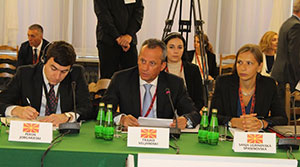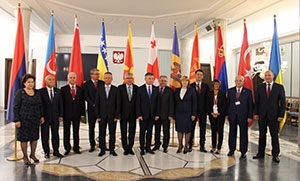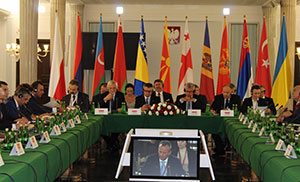 Wednesday, 31 August 2016, Warsaw
Wednesday, 31 August 2016, Warsaw
Address of the President Veljanoski at the parliamentary Meeting of Central and East Europe States
Distinguished Chairman,
Distinguished colleagues,
Ladies and gentlemen,
What kind of Europe we want and what is the future of EU and the integration processes of the aspiring states are questions which have been particularly popularized after the so called Brexit, in other words the referendum on which the citizens of Great Britain supported leaving EU. This is a decision that should be respected; it is a fact that this decision rises many unknown terms, doubts, even fear for the future of the Europe. Furthermore, the economic crisis that subjugated the whole world, the debt crisis in the framework of the European Union also opened many questions, dilemmas and doubts among some citizens. But this is not the first time Europe faces very difficult questions, dilemmas and challenges. I hope that, as it was the case so far, appropriate answers will be found and concrete steps for surpassing the affairs will be taken. With new and greater enthusiasm and institutional solutions the achievement of the fundamental principles and ideas of united Europe shall be found. Principles and ideas supported by the great European politicians such as Winston Churchill, Robert Shuman, Mone, Gaspari, Adenauer and other famous people who after the World War II were the visionaries of the principles and the foundations of today’s united Europe. Allow me to remind that those principles are the respect of individual and collective human rights and freedoms, parliamentary democracy and political pluralism, private property and market economy, up to regional cooperation. Today, following these particular principles established by these great Europeans, the face of Europe after the World War II is changed.
Ladies and gentlemen,
We must not forget that the first institutional organization of today’s Europe is based on the regional cooperation upon a particular mutual interest. In the framework of the European Union, the regional cooperation is prominent since the very beginnings of its institutionalization, going through all phases. Upon the fall of the Berlin Wall and the definition of the open doors policy, i.e. the enlargement with new member states, the principle of regional cooperation in its widest, are of crucial importance. Today, we even have terminological equalization between the regional policy and cohesive policy in the framework of EU. Thus, today in the framework of EU we have a special committee on regional cooperation, in which, certainly, without the right to vote, the candidate states for EU are members as well. Certainly, the primary goal of this regional cooperation is surpassing the economic, but also social differences among particular regions. In the same time, through the regional cooperation, the migration flows from the less to the more developed regions is decreased, which certainly influences the demographic image of some regions.
 Ladies and gentlemen,
Ladies and gentlemen,
For the East Europe states, in that framework, the region of Western Balkans, the regional cooperation is very important for many aspects. Let me start with the historic ones. Our region is crafty in creating turbulent history, but we learn little from it, hence the historic mistakes are repeated. That is why, today, the different historic antagonisms creating mistrust among the states silently smolder. We can surpass these antagonisms through a regional cooperation in all areas. Furthermore, ethic minorities living in each state of the region are more often stumbling block rather than a bridge for cooperation.
This is the case, only because some are not willing to respect the individual and collective human rights and freedoms and in this framework is the acknowledgement of the reality that national minorities exist and they should be acknowledged under all international norms. The disrespect of the solidarity as a principle the European Union is built on and functions today is something that unfortunately we, the citizens of the Republic of Macedonia have felt too frequently. For example, the Republic of Macedonia has received 6 recommendations for opening accession negotiations with EU, but due to the absurd bilateral issue and disrespect of the solidarity principle by our Southern neighbor we are blocked in our Euro Atlantic integration. Nevertheless, we as a state do not give up on the regional cooperation with all states in the region and in all areas. I will give only one example. A regular meeting with our Ambassadors and diplomatic and consular representatives with the state governance was held in Skopje last week. The aim was to be better acquainted with the interior affairs, as well as the strategic guidelines of our foreign policy. In the same time, Ministers of Foreign Affairs from the neighboring states are invited to these meetings organized by our Ministry of Foreign Affairs. This year our guest was the Minister of Foreign Affairs of Greece, Mr. Nikos Kotzias. Believe me, the main topic of the meeting was how different forms of cooperation create conditions for mutual trust and benefit the citizens of the two states as well as the region.
I would like to underline that the Republic of Macedonia as a small state with limited resources pays outmost attention to the regional cooperation and good neighborly relations. We wish to continue developing the bilateral and multilateral relations in the region and in general through inclusiveness,
A point we are not that good at, I believe due to the fact that either we do not know how or we are still in Balkan remiss, is the relatively low usage of the funds for regional cooperation allocated by EU. I believe that member states of EU from the region as well as from Central and South East Europe as well as the Offices of EU in our state can have more active role and assistance in this area.
 Distinguished friends,
Distinguished friends,
Today, the Iron Curtain is gone, as well as dictatorship of a single party regime. The classic bipolar division is gone as well. Today we are faced with the issues of the global terrorism, migration crisis, organized crime, i.e. issues that can be dealt with only through overall cooperation of all states and their institutions, including Parliaments. That is why I believe that as politicians we are obliged, for the sake of our mutual history and on behalf of our citizens, and above all for the sake of the future of our children and future generations to face these challenges. To create conditions for the young people of my state as well the youth from other states of the region, together with the youth of Poland, the Baltic, Scandinavian and Mediterranean states to dream together, build and develop United Europe.
Thank you.